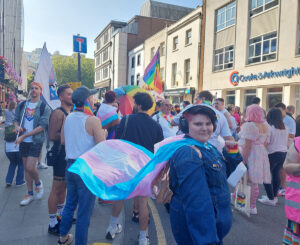 We are joining Pride Cymru this year to celebrate LGBTQ+ people in Wales. We are also going because we know that we can never take our rights for granted. We are worried in particular that people with a learning disability and autistic people who are transgender may have more rights taken away from them.
We are joining Pride Cymru this year to celebrate LGBTQ+ people in Wales. We are also going because we know that we can never take our rights for granted. We are worried in particular that people with a learning disability and autistic people who are transgender may have more rights taken away from them.
This article includes some hard words. We explain what these mean at the bottom of the article.
Celebrating LGBTQ+ people in Wales
Learning Disability Wales and Gig Buddies Cymru are proud to join Pride Cymru again this year. We will be walking in the parade with Mencap Cymru, Innovate Trust and the fabulous artists of House of Deviant. If you would like to join us, please email gigbuddies@ldw.org.uk or phone 029 2068 1160.
We believe that it is important to celebrate and show our support for LGBTQ+ people in Wales and to give all people with a learning disability a chance to celebrate their identity safely. Learning Disability Wales also prides itself on working towards a supportive and inclusive working environment for our staff. Attending Pride is important for many of us to celebrate ourselves and/or our LGBTQ+ colleagues, friends, and family members.
Pride is a celebration of diversity and people’s right to live their lives how they choose. But it is important to also remember that people have had to fight hard for these rights and that this fight is not over. Sadly, this fight seems to be getting harder in the UK recently and this has some potentially dangerous consequences for people with a learning disability in Wales.
Why are we worried?
We are concerned that some people are suggesting that people with a learning disability and autistic people are not able to make decisions about their own sexual orientation, sexuality and gender identify or expression. We are worried that some activists and politicians are arguing that when people with a learning disability express themselves this must be because they are being manipulated.
One example of this is the way that Drag Syndrome, a group of drag performers with Down syndrome from England, have been treated recently. Some people have said that they cannot consent to being performers because they have learning disabilities. Even though people may think they are protecting vulnerable people from abuse when they say things like this, they are in fact limiting the freedom of choice that people with a learning disability have, and damaging the careers of these very talented artists.
This year Welsh Government published their LGBTQ+ Action Plan for Wales. We are happy to see that this plan is inclusive of all LGTBQ+ people and we hope that it can support people with a learning disability to live the lives they choose.
However, we are concerned that during the consultation phase of this Action Plan, some anti transgender rights activists wrote about how the Plan might be harmful to autistic cis-gender women who may be falsely led to transition to male under this policy. Taking an international view, we are also aware that in some states of the USA, new laws are demanding that transgender people who want to get gender affirming care have to be screened for autism.
Everyone has the right to live the life they choose
We are very concerned that some people want to use the fact that someone has a learning disability or autism as a reason to not let them make decisions about their own lives. Everyone deserves to live the life they choose, to be their true selves and to love who they choose. We are joining Pride Cymru this year to celebrate LGBTQ+ people in Wales and because we know that fighting for equal rights is never finished. This is more important than ever right now.
Hard words
LGBTQ+
LGBTQ+ stands for lesbian, gay, bisexual, transgender, queer or questioning and others. This is a community of people who have things in common because of who they are and who they love:
- Lesbians are women who are attracted to other women.
- Gay men are men attracted to other men.
- Bisexual people are attracted to both men and women.
- A transgender or trans person is someone whose gender is not the same as the sex they were thought to be when they were born.
- Queer has sometimes been used as a bad word against LGBTQ+ people, but some people have started to use it in a positive way to describe themselves. For example, when they feel that words like straight, gay and lesbian do not describe them.
- Questioning is for people who are working out who they are and how they identify.
Cis-gender
A person whose gender is the same as the one people thought they were when they were born. For example, your doctor or parents called you a baby girl when you were born, and they got it right.
Non-binary
This is a person whose gender does not match usual ideas of what is male and what is female. A non-binary person may feel or know that they are neither a man nor a woman.
Sex
People are a particular sex because of physical things like sex organs and hormones. However, some people’s gender does not match the sex they were born with.
Sexual orientation
This is how a person feels, sexually, about other people. It is about attraction between people.
Easy read resources
LGBTQ+ – an easy read guide (PDF) – from Change
Transgender – an easy read guide (PDF) – from Choice Support
Stonewall Riots (New York) – LGBTQ+ easy read (PDF) – from Mencap
Supported Loving – person-centred organisation supporting people with a learning disability with issues surrounding sexuality and relationships.



 >
>
 >
>
